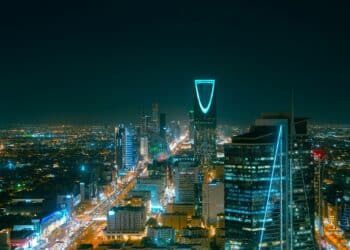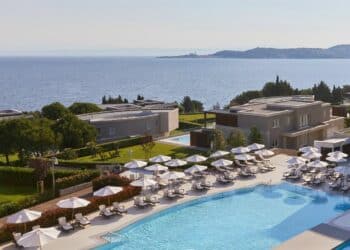Having broken the rules to become a culinary pioneer in his home city of Berlin, two-Michelin-starred chef and Netflix icon Tim Raue is discovering the trials of the Dubai market with his first international venture, Dragonfly by Tim Raue on City Walk.
By Crystal Chesters
 While Tim Raue is a pretty big deal in Germany – the two-Michelin starred chef currently oversees eight restaurants in his native country – he remains relatively unknown internationally. Eight months after opening his first international venture in Dubai with Dragonfly on City Walk, he is disappointed that customers aren’t practically breaking down the door to get in, like they do in Berlin.
While Tim Raue is a pretty big deal in Germany – the two-Michelin starred chef currently oversees eight restaurants in his native country – he remains relatively unknown internationally. Eight months after opening his first international venture in Dubai with Dragonfly on City Walk, he is disappointed that customers aren’t practically breaking down the door to get in, like they do in Berlin.
“I’m happy with the concept and the quality but I’m not happy that it’s not packed out and that we’re not doing double or triple seatings like we do in Berlin,” he tells Catering News on the sidelines of an event at the Dubai venue, which features striking red interiors, Asian lanterns, luxurious textures and floor-to-ceiling windows, reminiscent of an oriental tea room. “Normally when I open a restaurant, everyone knows me. You have to stand at the door and keep it closed because everyone wants in. Here, nobody was waiting on me.”
He expects his name to become better known now, following the spring release of his episode on the popular Netflix show, Chef’s Table. “For the third season, they wanted to take guys that have a unique story,” says Raue. “I was really lucky. They looked around Berlin and said ‘who’s the guy that can cook Asian food on that level? We have to take Tim’.”
Raue’s story certainly is unique, as the Netflix programme highlights. Having grown up in working-class Kreuzberg in Berlin, he was abused by his father and became involved in street gangs at a young age. Cooking is what saved Raue and a single-minded creativity and lack of regard for the rules of fine dining saw him rise through the ranks to become a culinary icon in Germany.
“Normally when I open a restaurant, everyone knows me. You have to stand at the door and keep it closed because everyone wants in. Here, nobody was waiting on me”
After receiving his first Michelin star, Raue decided that the traditional mix of Spanish and French fine dining cuisine that he had come to excel in, wasn’t actually his thing. Much to the dismay of his colleagues and investors, he began experimenting with Asian techniques and flavours, with a belief that his ability to combine these would set him apart from Asian chefs. “Chefs are interested in how I mix Cantonese cooking techniques with Thai flavours. No Cantonese chef will ever use Thai flavours and no Thai chef will use Cantonese techniques – they’re so in their own worlds, they cannot blend, but as Europeans we can easily transform things.”
Raue admits he didn’t like the way he was portrayed in the Netflix show; however, the PR benefits have been outstanding. “I don’t love [my episode] because it shows me being rude and it looks like it’s only me, whereas I have a team of more than 20 head chefs and restaurant managers. However, it’s so provocative that people who see it either love me or hate me.
“It’s a big honour, it’s the biggest honour you can have. When it was announced I would be in the third series, I had about 300 chefs calling me and asking me for a contact [at Netflix] – they wanted to be on it also. It’s the biggest value in my world, it packed out the restaurant, it was amazing, a rush of clients in Berlin.”
However, Raue’s excitement about his Chef’s Table episode is not to discredit two other life-changing moments, made all the more special by their timing – getting named Chef of the Year by Gault et Millau one week and gaining his first Michelin star the next.
“The Michelin star really pushed me over so many boundaries and increased the revenue of the restaurant by nearly 50%,” he says. “There was a tsunami of clients and awards; it changed my life from one day to the next.”
Another major achievement was having his eponymous restaurant, Restaurant Tim Raue, named at number 34 on The World’s 50 Best Restaurants list in 2016. “This year we dropped down on the list but we’re still on it. There’s number one, two and three and then everything else, so it doesn’t matter where you are on the list – just be on it!”
It’s clear that success is extremely important to Raue, and he is determined to achieve this in Dubai. He has all of the ingredients, with Meraas on side – whom he speaks very highly of – and with Christian Singer, previous chef de cuisine at Restaurant Tim Raue, and restaurant manager, Patricia Liebscher, running the venue. With more than double the investment that was put into Restaurant Tim Raue having gone into the Dubai venture, it’s important the team tweaks the offer quickly in order to ramp up demand. However, one issue that cannot be overcome is the fact that there is no alcohol licence, which is a challenge Raue has never faced before.
“It wasn’t something I thought about; I thought it didn’t matter, but it does,” he says, explaining that the team at Dragonfly have come up with a collection of ‘Jines’ – flavoured juices fermented in-house and served in wine glasses. “They have the difference in flavours, tastes and textures, but to be honest, people want alcohol. We’ll never have a licence though. Things would move better if we had alcohol, but we make the best of our opportunities.”

And this means highlighting the restaurant’s stand-out culinary offer, which mimics that of Raue’s two-starred venue. Dishes include the wasabi langoustine, deep-fried in tempura dough, complemented with wasabi mayonnaise and green riceflakes, and balanced with Thai mango jelly and a Thai street food-style dressing. One of the mains is turbot with kamebishi, leek and ginger, served with dry ice and hot water, simulating the steaming process and adding a touch of theatre. Meanwhile, one of Raue’s signature dishes, the peking duck, is recreated using a whole duck and three plates: one with roasted duck breast and a sauce of duck feet, the second with a stock made from the legs and bones of the duck, and the third, a cold mouse of fois gras. With Michelin-star quality food, Raue believes Dragonfly will stand apart from the other restaurants in town, which he says are more concerned with atmosphere.
“The quality we’re serving here is outstanding – more than [Meraas] expected. Everything is available in Dubai, but I’ve also seen I can be very focused on the food and that’s not happening here. [In Dubai] you have to have a really good atmosphere, that is number one. Number two is service and licence and number three is the food – that’s different to 99% of the restaurants in the rest of the world.”
“I don’t love my [Chef’s Table episode] because it shows me being rude and it looks like it’s only me, whereas I have a team of more than 20 head chefs and restaurant managers. However, it’s so provocative that people who see it either love me or hate me”
Raue is conscious however, that he has to adapt to what the market wants, and the first step will be toning down the atmosphere and service to a more casual offer, and pumping up the music – something he has never had to consider in Germany. “We have to adjust it to make it a bit more casual. This is Dubai and the locals and expats like good food but in a relaxed atmosphere. This is what you have to learn when you go to a new region – it’s not enough just having success there, it doesn’t mean you’ll have success in Dubai.”
Dragonfly on City Walk has been a learning curve for Raue, who drops a big hint by saying that next time he would do things differently. While he is open to more concepts in Dubai, he has no plans of expanding elsewhere internationally for now.
“I’m very focused and I think the Dubai market is pretty big. Meraas is a great partner and they will open so many more places. I have a couple of concepts and I will stay close with them and focused on them. I’m not trying to spread around the world; I’m focused on one place and I’ve now learned to understand the Dubai market more deeply.”


































































